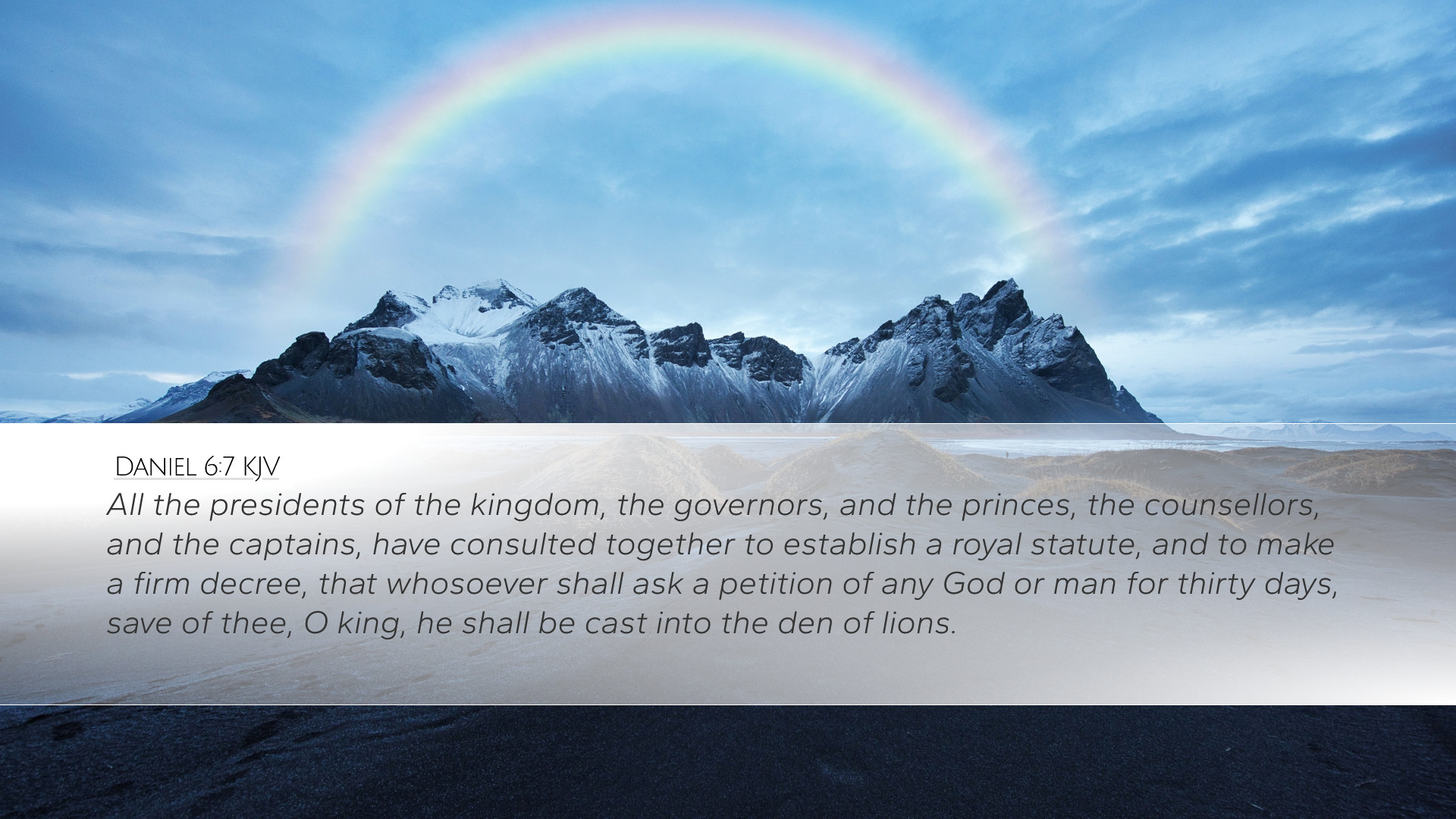Commentary on Daniel 6:7
Verse Reference: Daniel 6:7 - “All the presidents of the kingdom, the deputies, and the satraps, the counselors, and the governors, have consulted together to establish a royal statute and to make a firm decree, that whoever petitions any god or man for thirty days, except you, O king, shall be cast into the den of lions.”
Overview
This verse introduces the plot against Daniel, revealing the political intrigue and jealousy prevalent among the ruling officials of Babylon. The schemers aim to eliminate Daniel, whose exceptional qualities have made him a target of envy.
Commentary Insights
Political Context
Matthew Henry observes that the jealousy of the other rulers led them to conspire against Daniel, demonstrating how envy can corrupt leadership. These ambitious men, feeling threatened by Daniel's elevated status, convene to devise a scheme that would endanger his life.
Albert Barnes notes that the gathering of the “presidents, deputies, and satraps” signifies a united front among the government leaders in Babylon. Their decision to approach the king not only reveals their malice but also their manipulation of royal authority for personal vendettas, a common theme in the struggles of power within political structures.
The Nature of the Conspiracy
Adam Clarke emphasizes that the specificity of their decree—that only the king is to be petitioned—reveals their strategy to isolate Daniel from any divine assistance. By limiting appeals to the king, they seek to create a situation in which Daniel cannot pray to God without facing dire consequences.
This reflects a broader principle in spiritual warfare: when faithfulness to God stands to be punished by earthly authorities, followers of God must consider both the risks and the allegiance owed to Him. Clarke implies that while human authority is significant, it must never overshadow devotion to God.
Understanding the Decree
The decree made by the conspirators establishes a temporary yet significant theological crisis. Matthew Henry states that by creating an unjust law that hinders worship, these leaders aim to divert allegiance from God towards the king, thus attempting to undermine the covenant between God and His people.
Albert Barnes points out that this statute mirrors ancient practices where rulers demanded absolute loyalty, often enforced through severe punishment. This practice serves as a cautionary tale for modern readers, reminding them of the importance of distinguishing between obeying God and obeying man.
Application for Believers
Adam Clarke urges readers to consider how they respond to authoritative mandates that oppose their faith. The decree serves as a challenging call for believers: when faced with opposition, how do we stand firm in our petitions to God? The unity among conspirators against Daniel reminds us that while we may face collective opposition, our faith and petitions remain a refuge.
Key Takeaway: Those in leadership, whether secular or spiritual, must strive to maintain integrity and equity, recognizing how envy and ambition can corrupt decision-making. For believers, the story encourages prayer fidelity even in the face of harsh consequences.
Theological Reflection
Daniel 6:7 ultimately speaks to the broader theme of God’s sovereignty amid human machinations. Matthew Henry reflects on how God’s providence allows situations to unfold that may appear dire but serve to showcase divine power and faithfulness. The actions of the conspirators, though malicious, fit into God’s plan for demonstrating His might and the unwavering faith of His servants.
Albert Barnes posits that this event foreshadows troubling times for believers but also serves as an assurance that faithfulness to God will ultimately be vindicated. The opposition Daniel faces is not merely personal but reflects the eternal struggle between good and evil, obedience to God versus submission to worldly powers.
Conclusion
In summary, Daniel 6:7 offers profound insights for spiritual leaders, educators, and theologians about the nature of leadership, the challenge of loyalty, and the importance of maintaining faith amidst opposition. Matthew Henry, Albert Barnes, and Adam Clarke collectively urge believers to uphold their petitions to God, regardless of earthly mandates, assuring them that God’s sovereign plan is at work in all circumstances.


